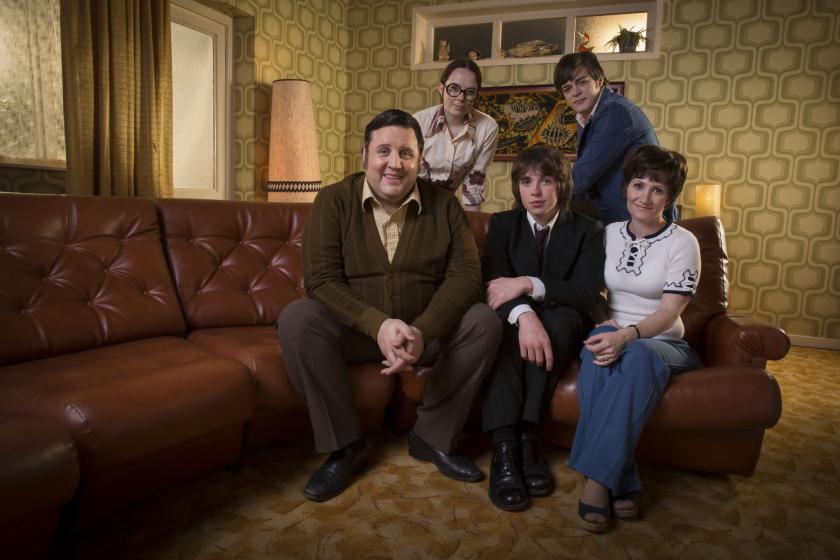Turning autobiography into comedy gold is an alchemy that has often been tried. Among them Caitlin Moran’s Raised by Wolves, Kathy Burke’s superb Walking and Talking, and the mooted but, as yet uncommissioned story of Jeremy Clarkson’s childhood, provisionally titled For Whom the Bellend Trolls.
When dealing with real-life reminisces, the balance between believability and comedy is a very difficult thing to get right. Slight situations can provide big laughs in a living, breathing reality, and the temptation is to supersize them for telly to make sure that everyone is in on the joke. The resulting gap between realism and farce can prove too big for some jokes to make it over – many are lost in the abyss.
So big and bold are the actual events in the source material for Cradle to Grave – Danny Baker’s 2011 autobiography, Going to Sea in a Sieve – that there’s little danger of this happening. No magnification is necessary to render the larger-than-life character of Danny’s father, Fred ‘Spud’ Baker, for TV, or the seemingly endless, laugh-out-loud anecdotes that Baker delights in telling of his time in Bermondsey, growing up with friends and family.
As with all first episodes, there was a great deal of background to fill in. The voiceover transition from Baker’s own voice to the younger him, played with wide-eyed gusto by Laurie Kynaston, took care of some of this, as did the careful plotting of the episode. At first, the switching between events seemed slightly scattergun, as some of the most memorable moments from the book (involving two-tone tonic trousers, a boyfriend in plimsolls, and an ill-fated trip to naked hippie musical Hair) were telescoped down into a TV half hour. It was rather like listening to a friend tell a story in a pub, shooting off on tangents that seem like digressions, but end up embellishing and improving the payoff. While later episodes stick more closely to comedy A-roads, this more scenic route was perfect for establishing characters and tone.
Amid the ducking and diving of everyday life, there was a warmth about the show and a joie de vivre that made the casting of Peter Kay in the role of Spud seem a perfectly sensible decision. A brusque and no-nonsense man, Spud appears to have been someone who didn’t suffer fools – instead opting for a sweary dressing-down before the promise of a slap. That aside, he was clearly a very funny man with exceptional natural timing and Kay certainly brings that to the role. What he also brings is an accent that is, perhaps, a little too studied. Maybe it’s the fact that I’m so used to the distinctive voice that goes with that face that cognitive dissonance wouldn’t allow me to hear the London drawl properly, or perhaps it’s the familiar comic cadences that Kay employs, but I fully expected to hear him bellow, “Fuckin’ put big light on” at any given point. That said, I’ve watched ahead and it jars less as time goes on and he is a fantastically likeable presence on screen – as are the rest of the core ensemble: Danny’s mum Bet (Lucy Speed), brother Michael (Frankie Wilson) and sister Sharon (Alice Sykes).
Danny Baker, along with co-writer Jeff Pope (Cilla, Philomena), has certainly not scrimped on detail – much of it musical. There was a fabulous soundtrack (the early appearance of Tomorrow Night by Atomic Rooster raised a beaming smile) and the White Noise poster in the young Danny’s bedroom provided a particular nerdish highlight. The pair have – most importantly – presented us with a view of British life in the Seventies that’s bright enough to lighten the darkest of moods and breezy enough to carry us over life’s bumps. The lack of dull tones and sepia moods is a welcome change to the usual depiction of a decade that was, in many ways, fantastically exciting. However, while some, me included, find Baker’s relentless optimism infectious, there is a danger that others may find Cradle to Grave too cloying and saccharine because of it. Oh well, their loss.















Add comment